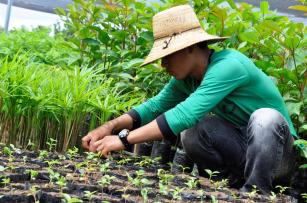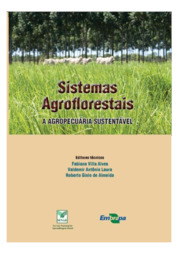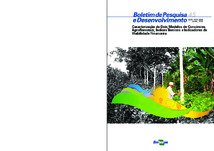Agroforestry systems for environmental production and recovery in the Amazon
 Busca de Projetos
Busca de Projetos
Agroforestry systems for environmental production and recovery in the Amazon

Photo: NORIEGA, Guadalupe Kristel Bueno
Agroforestry systems (AFS) combine planting trees with agricultural crops or animal husbandry and are considered suitable production systems for the Amazon region because they reconcile agricultural production with the conservation of natural resources, which is a great challenge today.
This project intends to develop efficient agroforestry systems that are compatible with the Amazonian environment and that generate a positive impact on the socio-economic conditions of rural producers in settlement projects and extractive reserves in the Amazon. AFS allow the possibility of restoring forest landscapes and work as tools for the rehabilitation of legal reserve areas, riparian forests, and other permanent preservation areas. In extractive reserve areas in the Amazon region, which is one of the focuses of this project, it also offers the advantage of restraining the expansion of livestock farming, increasing the productivity of non-timber products, and ensuring the food security of families, which has been threatened by population growth. However, despite such advantages accredited to the AFS and several successful examples of systems in the region that could be validated and disseminated, the adoption of agroforestry in the Amazon still remains a major challenge.
This project also aims to contribute with information on the direct application of the National Plan for the Consolidation of a Low-Carbon Economy in Agriculture, the ABC Plan. Among other measures, this Government program has set out to implement and intensify research, development, and innovation actions in Integrated Crop-Livestock-Forest (ICLF) production systems and agroforestry systems.
This research project aims to identify arrangements and models of agroforestry systems for different states of the Amazon region (surveying the species, costs, workforce demand, management, productivity etc.); survey technical coefficients and financial indicators of the main regional arrangements; and perform more advanced studies on the assessment of biomass and carbon stocks in the soil, on greenhouse gas emissions (GHG) and on the neutralization of emissions in integrated system (ICLF and AFS). With the obtained results, we intend to indicate at least five models of AFS for different Amazon states.
The project also provides for the standardization of spreadsheets for financial analysis of AFS and other scientific methods that will compose a methodology for planning the deployment of agroforestry systems. At the end of the project, there will be a set of information needed for the appropriate implementation and development of agroforestry production activities and management practices.
This project intends to develop efficient agroforestry systems that are compatible with the Amazonian environment and that generate a positive impact on the socio-economic conditions of rural producers in settlement projects and extractive reserves in the Amazon. AFS allow the possibility of restoring forest landscapes and work as tools for the rehabilitation of legal reserve areas, riparian forests, and other permanent preservation areas. In extractive reserve areas in the Amazon region, which is one of the focuses of this project, it also offers the advantage of restraining the expansion of livestock farming, increasing the productivity of non-timber products, and ensuring the food security of families, which has been threatened by population growth. However, despite such advantages accredited to the AFS and several successful examples of systems in the region that could be validated and disseminated, the adoption of agroforestry in the Amazon still remains a major challenge.
This project also aims to contribute with information on the direct application of the National Plan for the Consolidation of a Low-Carbon Economy in Agriculture, the ABC Plan. Among other measures, this Government program has set out to implement and intensify research, development, and innovation actions in Integrated Crop-Livestock-Forest (ICLF) production systems and agroforestry systems.
This research project aims to identify arrangements and models of agroforestry systems for different states of the Amazon region (surveying the species, costs, workforce demand, management, productivity etc.); survey technical coefficients and financial indicators of the main regional arrangements; and perform more advanced studies on the assessment of biomass and carbon stocks in the soil, on greenhouse gas emissions (GHG) and on the neutralization of emissions in integrated system (ICLF and AFS). With the obtained results, we intend to indicate at least five models of AFS for different Amazon states.
The project also provides for the standardization of spreadsheets for financial analysis of AFS and other scientific methods that will compose a methodology for planning the deployment of agroforestry systems. At the end of the project, there will be a set of information needed for the appropriate implementation and development of agroforestry production activities and management practices.
Ecosystem: Amazonic
Status: Completed Start date: Sat Sep 01 00:00:00 GMT-03:00 2012 Conclusion date: Wed Aug 31 00:00:00 GMT-03:00 2016
Head Unit: Embrapa Acre
Project leader: Tadario Kamel de Oliveira
Contact: tadario.oliveira@embrapa.br


